(完整)新概念青少版2A复习总结[语法],推荐文档
(完整)新概念英语青少年版资料汇总,推荐文档

(完整)新概念英语青少年版资料汇总,推荐⽂档新概念英语青少年版资料汇总《新概念英语青少版》是“新概念英语”教学体系的新成员,由世界著名英语教学专家路易·亚历⼭⼤、朱莉娅·亚历⼭⼤和罗伊·⾦斯伯⾥专为中国8-14岁的青少年以及英语初学者编写。
整套教材分为6个级别,每个级别含A、B两个分册,具体包括StarterA、Starter B;1A、1B;2A、2B;3A、3B;4A、4B;5A、5B。
《新概念英语青少版》⼊门级并⾮零起点,但是从26个字母的学习开始的;1A1B、2A2B、3A3B的知识点与《新概念英语》经典版第⼀册的知识点基本对应;4A4B和5A5B的知识点与新概念英语》经典版第⼆册的知识点基本对应。
1、对话与课⽂是以⼀个英国家庭以及他们的朋友的故事为主线的;2、语法⼤纲更加强调渐进性,在讲解新语法内容的同时,不断复习已学过的语法知识;3、学⽣⽤书包括了“对话练习”和“句型练习”,这些内容在以前出版的书中只出现在教师⽤书⾥。
学⽣⽤书还听了更加丰富的听⼒、阅读和写作材料。
新概念英语青少版⼊门1A(PDF+视频)新概念英语青少版⼊门1B(PDF+视频)新概念英语青少版1A(PDF+视频)新概念英语青少版1B(PDF+视频)新概念英语青少版2A(PDF+视频)新概念英语青少版2B(PDF+视频)新概念英语青少版3A(PDF+视频)新概念英语青少版3B(PDF+视频)新概念英语青少版4A新概念英语青少版4B新概念英语青少版5A新概念英语青少版5B教学⽅法IN your mind记单词:每个单词的讲解限定在最常⽤的三个⽤法之内,强调讲练结合,当堂记忆;⽤语法:结合⽇常实例,将语法学习与实际使⽤机密结合,不做语法专家,要做使⽤能⼿;学⽂化:海归派教师将为您倾情演绎地道鲜活的中西⽂化差异,轻松快乐跨越⽂化鸿沟;背课⽂:容阅读,写作,⽂化,语⾔点为⼀体,思路犀利,讲解独到,祝您透彻理解,轻松成诵。
新概念英语青少版2A知识点整理
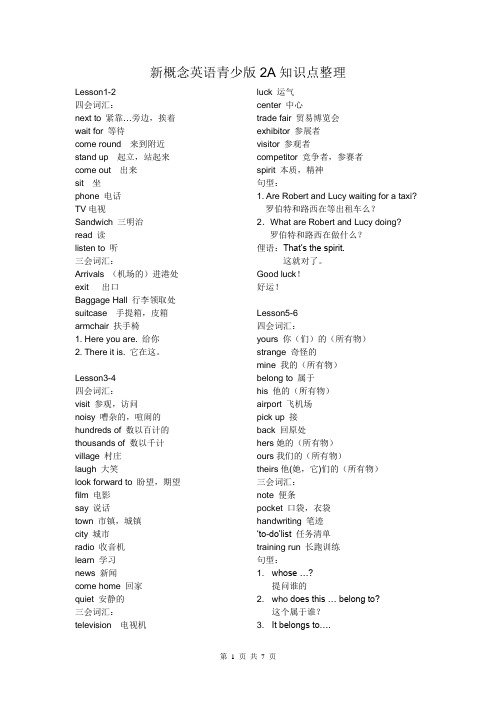
新概念英语青少版2A知识点整理Lesson1-2四会词汇:next to 紧靠…旁边,挨着wait for 等待come round 来到附近stand up 起立,站起来come out 出来sit 坐phone 电话TV电视Sandwich 三明治read 读listen to 听三会词汇:Arrivals (机场的)进港处exit 出口Baggage Hall 行李领取处suitcase 手提箱,皮箱armchair 扶手椅1. Here you are. 给你2. There it is. 它在这。
Lesson3-4四会词汇:visit 参观,访问noisy 嘈杂的,喧闹的hundreds of 数以百计的thousands of 数以千计village 村庄laugh 大笑look forward to 盼望,期望film 电影say 说话town 市镇,城镇city 城市radio 收音机learn 学习news 新闻come home 回家quiet 安静的三会词汇:television 电视机luck 运气center 中心trade fair 贸易博览会exhibitor 参展者visitor 参观者competitor 竞争者,参赛者spirit 本质,精神句型:1. Are Robert and Lucy waiting for a taxi? 罗伯特和路西在等出租车么?2.What are Robert and Lucy doing?罗伯特和路西在做什么?俚语:That’s the spirit.这就对了。
Good luck!好运!Lesson5-6四会词汇:yours 你(们)的(所有物)strange 奇怪的mine 我的(所有物)belong to 属于his 他的(所有物)airport 飞机场pick up 接back 回原处hers她的(所有物)ours我们的(所有物)theirs他(她,它)们的(所有物)三会词汇:note 便条pocket 口袋,衣袋handwriting 笔迹‘to-do’list 任务清单training run 长跑训练句型:1. whose …?提问谁的2. who does this … belong to?这个属于谁?3. It belongs to….它属于…1. let sb. do sth.2. give sb. sth. / give sth. to sb.Lesson 7-8四会词汇:hour 小时put on 穿上walk 走take off 脱下turn on 打开turn off 关掉letter 信throw away 扔掉三会词汇top three percent 最好的百分之三volunteer 自愿者Congratulations! 祝贺Well done! 做得很好!foil jacket 保暖夹克hero英雄this way 这边medal 奖章put up 挂起curtain 窗帘take down 拿下picture 图画so 非常pleased 高兴的Best wishes 最美好的祝福句型:1. Are you going to have a drink?你打算去喝些东西么?2. I’m going to have lunch.我打算去吃午餐。
完整word版)新概念英语青少版2A单词表

完整word版)新概念英语青少版2A单词表新概念英语青少版2AUnit 1 XXXXXX.紧靠。
旁边,挨着Arrivalsn.(机场的)进港处XXXwait forv+prep等待Baggage Hall行李领取厅suitcasen.手提箱,皮箱XXX来到附近XXX.站立XXX.电话XXX出来XXX.坐sandwichn.三明治armchairn.扶手椅sand upv+prep起立,站起来readv.读TVn.电视listen tov+prep听Unit 2 Good luck on Sunday XXX运气XXX记者XXXvisit参观,访问trade fair贸易博览会noisy喧闹的,热闹的hundreds of数以百计exhibitor参展者thousands of数以千计visitor观光者village乡村XXX笑competitor合作者XXX听众look forward to盼望spirit本质,精神film电影say说town市镇,城镇city城市单词表收音机learn研究news消息come home回家XXX电视机quiet平静的Unit 3 Is this yours? yourspron.你(们)的(一切物)strangeadj.奇特的XXX.便条pocketn.口袋,衣袋XXX.我的(所有物)XXX prep.属于handwritingn.字迹hispron.他的to-do XXX.工作清单XXX.飞机场pick XXX接XXX.长跑训练XXX.回原处why on earth?究竟XXX.她的ourspron.我们的XXX.他(她它们)的一切物Unit 4 The top three percenttop three pound n.最好的百分之三XXX.意愿者ns!fixed XXX祝愿XXX.小时Well done!fixed phrase做得很好XXX保暖夹克put onv。
Unit14Chocolateheaven!知识点(讲义)新概念英语青少版2A

Unit 14 Chocolate heaven! 巧克力天堂!一、重点单词及拓展:1. share 动词,分享;分担短语:share...with...与...分享例:I have many storybooks, I can share them with you.我有很多故事书,我可以和你一起分享。
Can you share your feeling with me?你能和我分享一下你的感受吗?2.contain 动词,包含;容纳例:This chocolate contains 50% cocoa. 这种巧克力包含50%的可可粉。
The bag contained a Christmas card. 这个包里装着一张圣诞卡。
container 名词,集装箱;容器造句练习1:1)你应该和我们一起分享这些食物。
2)这本书包含5个短故事。
3.else 可做形容词和副词,意思是“别的”“其它的”1)放在疑问词who, what, where等的后面,作后置定语。
例:Who else can you see?你还能看见别的什么人?Where else do you want to go?你想去别的什么地方吗?2)放在复合不定代词的后面。
例:Is there anything else in your bag?你的包里还有别的什么东西吗?Does anyone else know about it?还有别的什么人知道这件事吗?专项练习1:what else________________ when else_____________________something else_________________somebody else______________ nothing else_______________4.not...at all 一点也不,根本不(比一般的否定句否定程度更深)注意:not 不能单独使用,要用在助动词/系动词/情态动词的后面。
青少版新概念2AUnit1完整版

扶手椅
5
坐6
行李领 取厅1
来到附近8
电话7
根据汉语说出英 语单词.
aunt
son mother
sister
Listen to the recording, and then answer these questions: Where is Karen, and who is she waiting for
注意:
send them to him 不能改写成send him them give it to her 不能改写成 give her it 当短语中的sth为名词时,两种句式可以相互转换。 如果sth 为代词(it,them)只能用 give sth to sb
show them flowers =show flowers to them
Where is Linda and what is she doing
• Linda is in the Baggage hall. • She is waiting for her suitcase.
What can you see from the picture?
Who is with Karen?
注意:
下面这几个动词不能用于现在进行时
like hear find see want
coffee bar 咖啡吧
new words
arrival
[ə'raɪv(ə)l]
exit
['egzɪt]
baggage ['bægɪdʒ]
hall
[hɔːl]
suitcase
['suːtkeɪs]
come round [ raʊnd ]
青少版新概念知识点总结

Theoldman__________atsixo’clockinthemorningeveryday.
7、你从哪里来Where_____youfrom或Where_____you_____from
我从美国来。I_____fromAmerica.或I_____fromAmerica.
3、魏芳不是在读书,她在写信。
WeiFang__________abook.She__________aletter.
4、今天天气怎么样_____istheweathertoday
或 _____istheweather_____today
5、我正在通过收音机学(learn)英语。I__________Englishontheradio.
一般疑问句:Do/Does+主语+v.原形....... Yes,主语+do/does.
Do you always arrive at school very early No,主语+don’t/doesn’t.
Does Lucy have a rest every afternoon
特殊疑问句:特殊疑问词+do/does+主语+v.原形.......
练习:
1、学生们在干什么有一些在打电话,另一些躺在沙滩上。
__________thestudents_____Some__________onthephone,
________ _____onthebeach.
2、“格林先生在看电视吗”“不,他在打扫房间。”
“_____MrGreen_____TV”“_____,He__________thehouse.”
(完整word版)新概念英语青少版2A单词表

新概念英语青少版2A单词表Unit 1 Linda comes to Londonnext to prep. 紧靠。
.。
旁边,挨着Arrivals n. (机场的)进港处exit n. 出口wait for v+prep 等待Baggage Hall 行李领取厅suitcase n. 手提箱,皮箱come round v+prep 来到附近stand v. 站立phone n. 电话come out v+adv. 出来sit n。
坐sandwich n. 三明治armchair n. 扶手椅sand up v+prep 起立, 站起来read v. 读TV n。
电视listen to v+prep 听Unit 2 Good luck on Sundayluck 运气reporter 记者centre 中心visit 参观,访问trade fair 贸易博览会noisy 嘈杂的,喧闹的hundreds of 数以百计exhibitor 参展者thousands of 数以千计visitor 参观者village 村庄laugh 笑competitor 竞争者listener 听众look forward to 盼望spirit 本质,精神film 电影say 说town 市镇,城镇city 城市radio 收音机learn 学习news 新闻come home 回家television 电视机quiet 安静的Unit 3 Is this yours?yours pron. 你(们)的(所有物)strange adj。
奇怪的note n。
便条pocket n. 口袋,衣袋mine pron. 我的(所有物)belong to v. + prep。
属于handwriting n。
笔迹his pron。
他的to—do list n。
工作清单airport n. 飞机场pick up v.+ adv。
接training run n。
Unit8Anicequietafternoon.知识点(讲义)新概念英语青少版2A

Unit 8 A nice quiet afternoon 一个美妙宁静的下午一.重点单词及拓展:1.easy 形容词,简单的〔反义词〕difficult/hard 困难的,做定语或表语短语:take it easy 不焦急;放松free and easy 任凭的例:It is easy to study English well. 学好英语很简单。
Take it easy, we have enough time. 别焦急,我们有足够的时间。
2.along 介词,沿着,指沿着一条直线在水平方向上运动through 介词,穿过,侧重从一端穿到另一端〔从内部穿过〕across 介词,指"从……的一边到另一边",强调横过〔从外部穿过〕分析:1)Please walk along this road.2)Can you see that bird through the window?3)We can’t swim across that river.练习: 填上适宜的along, through或across1)I see him running_______the street.2)We want to walk________the river.3)He quickly walked________the hall.〔大厅〕4)Look, the bird is flying______the river.3.Why not的用法1〕Why not + 动词原形.....?为什么不.....?例:Why not ask your teacher?为什么不问问你的老师?Why not play football with us? 为什么不和我们一起踢足球?2)Why don’t you + 动词原形.....? 你为什么不......?Why don’t you ask your teacher? 你为什么不问问你的老师呢?Why don’t you go with us? 你为什么不跟我们一起走呢?造句练习:1)数学不太简单。
新概念英语青少版 2A语法大全之欧阳法创编
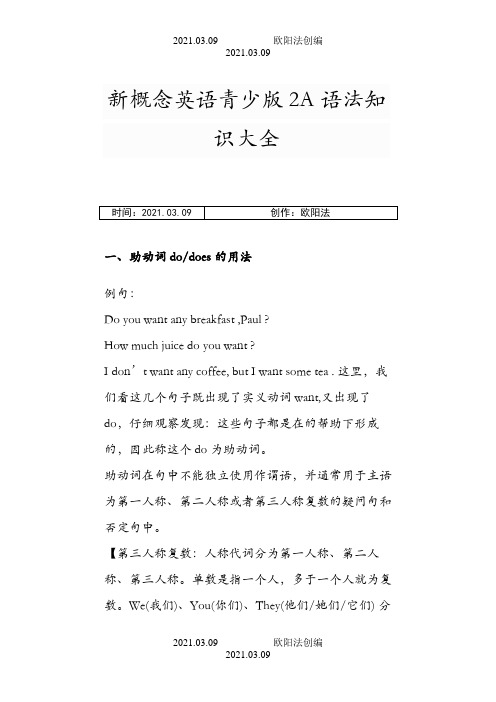
新概念英语青少版2A语法知识大全一、助动词 do/does 的用法例句:Do you want any breakfast ,Paul ?How much juice do you want ?I don’t want any coffee, but I want some tea . 这里,我们看这几个句子既出现了实义动词want,又出现了do,仔细观察发现:这些句子都是在的帮助下形成的,因此称这个do为助动词。
助动词在句中不能独立使用作谓语,并通常用于主语为第一人称、第二人称或者第三人称复数的疑问句和否定句中。
【第三人称复数:人称代词分为第一人称、第二人称、第三人称。
单数是指一个人,多于一个人就为复数。
We(我们)、You(你们)、They(他们/她们/它们) 分别是第一人称、第二人称、第三人称的复数形式。
】1、将一个肯定句变为疑问句时,应将do/does放在主语的前面,实义动词用原形。
例句:I/ We / You want some yoghurt. →Do you want any yog hurt ?William wants some beer.→Does William want any beer?She likes that one. →Does she like that one?2、变否定句时则要在句中谓语动词的前面加do not(don’t)或doesn’t。
例句:I don‘t want any coffee, but I want some tea .She doesn‘t like that one. →Doesn‘t she like that one? William wants some beer.→William doesn‘t want any bee r.3、变特殊疑问句时,见一、2、D/讲解部分及特殊疑问词部分。
二、Can/Must/May等情态动词的用法1、can的具体用法:can是情态动词,不能在句中单独作谓语,必须和其他动词原形构成谓语。
新概念青少版2A各单元重点归纳
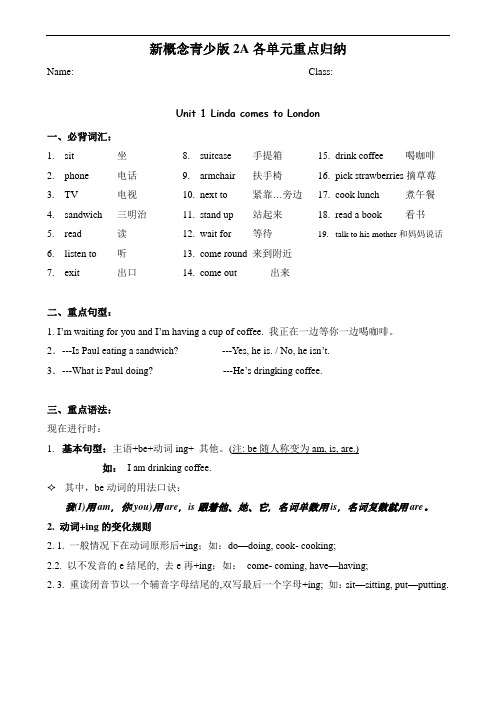
新概念青少版2A各单元重点归纳Name:___________________ Class:___________________Unit 1 Linda comes to London一、必背词汇:1.sit 坐2.phone 电话 电视4.sandwich 三明治5.read 读6.listen to 听7.exit 出口8.suitcase 手提箱9.armchair 扶手椅10.next to 紧靠…旁边11.stand up 站起来12.wait for 等待e round 来到附近e out 出来15.drink coffee 喝咖啡16.pick strawberries摘草莓17.cook lunch 煮午餐18.read a book 看书19.talk to his mother和妈妈说话二、重点句型:1. I’m waiting for you and I’m having a cup of coffee. 我正在一边等你一边喝咖啡。
2.---Is Paul eating a sandwich? ---Yes, he is. / No, he isn’t.3.---What is Paul doing? ---He’s dringking coffee.三、重点语法:现在进行时:1.基本句型:主语+be+动词ing+ 其他。
(注: be随人称变为am, is, are.)如:I am drinking coffee.其中,be动词的用法口诀:我(I)用am,你(you)用are,is跟着他、她、它,名词单数用is,名词复数就用are。
2. 动词+ing的变化规则2. 1. 一般情况下在动词原形后+ing;如:do—doing, cook- cooking;2.2. 以不发音的e结尾的, 去e再+ing;如:come- coming, have—having;2. 3. 重读闭音节以一个辅音字母结尾的,双写最后一个字母+ing; 如:sit—sitting, put—putting.Unit 2 Good luck on Sunday!一、重点词汇:1.visit 参观,访问2.visitor 参观者3.noisy 嘈杂的4.village 村庄ugh 大笑6.film 电影7.say 说话8.town 市镇,城镇9.city 城市10.radio 收音机11.learn 学习12.news 新闻13.quiet 安静的14.television 电视机15.luck 运气16.center 中心e home 回家18.listen to the radio听收音机19.learn English 学习英语20.watch the news 看新闻21.play football 踢足球22.have lunch 吃午餐23.go out 外出24.hundreds of 数以百计的25.thousands of 数以千计26.look forward to 盼望,期望二、重点句型:1. --- Are Robert and Lucy waiting for a taxi? 罗伯特和露西在等出租车么?---Yes, they are. / No, they aren’t.2. ---What are Robert and Lucy doing? 罗伯特和露西在做什么?--- They are waiting for a bus. 他们正在等公交车。
(完整版)新概念青少版2A复习总结(语法)

新概念2A总复习Part 1 时态1、基本结构:be+doing (do代指所有动词原形)肯定句:主语+am/is/are+doing......My mother is talking with the dentist.否定句:主语+am/is/are not+doing...They aren’t playing games.一般疑问句:Is/Are+主语+doing...? Yes,主语+am/is/are...Is she waiting for a bus? No,主语+am/is/are not.特殊疑问句:特殊疑问词+is/are+主语+doing....?Where are they doing their homework?2、动词现在分词变化规则:1)一般情况下,直接在动词后加-ingwork ---- working sleep ----- sleeping study ----- studying2) 动词以不发音的-e结尾,要去-e加-ingtake ----- taking make ----- making dance ----- dancing3) 重读闭音节的动词,要双写词尾字母,再加-ingcut ----- cutting put ----- putting begin ------ beginning4) 以-ie结尾的动词,把变成y再加-inglie ----- lying tie ----- tying die ----- dying①表示客观事实、真理②经常发生、有规律的事情1、基本结构:①带有be动词: 主语+am/is/are+肯定句:主语+am/is/are+n./adj./prep.短语...The sky is blue.My music book is in the bag.否定句:主语+am/is/are not+n./adj./prep.短语...It isn’t my magazine.The curtain isn’t clean.一般疑问句:Is/Are+主语+n./adj./prep.短语...? Yes,主语+am/is/are.Are these gloves yours? No,主语+am/is/are not.Is there any water in the jug?特殊疑问句:特殊疑问词+is/are+主语+n./adj./prep.短语....?Which one is right?Who is the man in a black hat?②带有实义动词:主语+(never/sometimes/often/usually/always)v.原形/v.三单+....(every morning/day/week.)肯定句:主语+v.原形/三单+.......They usually live in dry places. It sometimes rains in summer. 否定句:主语+don’t /doesn’t +v.原形+....... We don’t go to school on weekends.一般疑问句:Do/Does+主语+v.原形.......? Yes,主语+do/does.Do you always arrive at school very early? No,主语+don’t/doesn’t. Does Lucy have a rest every afternoon?特殊疑问句:特殊疑问词+do/does+主语+v.原形.......?Why does she always arrive so late? 2、动词第三人陈单数变化规则: 1)一般直接在动词尾直接加 s.如: play —plays, want —wants, work —works,know —knows,help —helps, get —gets2)以字母s 、x 、ch 、sh 结尾的动词加-es guess—guesses,fix—fixes,teach—teaches,brush—brushes,watch—watches,catch—catches3)以辅音字母+y 结尾的动词,先变y 为i,再加-es.发音/z/如:study—studies,carry—carries,fly—flies,worry—worries1、学生们在干什么?有一些在打电话,另一些躺在沙滩上。
新概念青少版2A各单元重点归纳
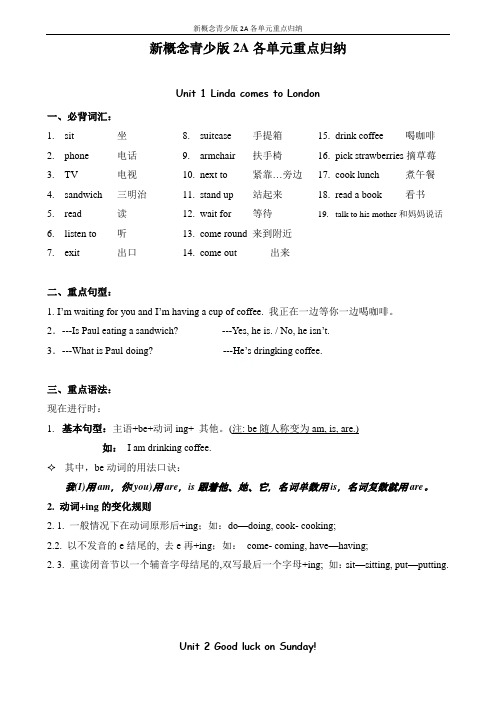
新概念青少版2A各单元重点归纳Unit 1 Linda comes to London一、必背词汇:1.sit 坐2.phone 电话 电视4.sandwich 三明治5.read 读6.listen to 听7.exit 出口8.suitcase 手提箱9.armchair 扶手椅10.next to 紧靠…旁边11.stand up 站起来12.wait for 等待e round 来到附近e out 出来15.drink coffee 喝咖啡16.pick strawberries摘草莓17.cook lunch 煮午餐18.read a book 看书19.talk to his mother和妈妈说话二、重点句型:1. I’m waiting for you and I’m having a cup of coffee. 我正在一边等你一边喝咖啡。
2.---Is Paul eating a sandwich? ---Yes, he is. / No, he isn’t.3.---What is Paul doing? ---He’s dringking coffee.三、重点语法:现在进行时:1.基本句型:主语+be+动词ing+ 其他。
(注: be随人称变为am, is, are.)如:I am drinking coffee.其中,be动词的用法口诀:我(I)用am,你(you)用are,is跟着他、她、它,名词单数用is,名词复数就用are。
2. 动词+ing的变化规则2. 1. 一般情况下在动词原形后+ing;如:do—doing, cook- cooking;2.2. 以不发音的e结尾的, 去e再+ing;如:come- coming, have—having;2. 3. 重读闭音节以一个辅音字母结尾的,双写最后一个字母+ing; 如:sit—sitting, put—putting.Unit 2 Good luck on Sunday!一、重点词汇:1.visit 参观,访问2.visitor 参观者3.noisy 嘈杂的4.village 村庄ugh 大笑6.film 电影7.say 说话8.town 市镇,城镇9.city 城市10.radio 收音机11.learn 学习12.news 新闻13.quiet 安静的14.television 电视机15.luck 运气16.center 中心e home 回家18.listen to the radio听收音机19.learn English 学习英语20.watch the news 看新闻21.play football 踢足球22.have lunch 吃午餐23.go out 外出24.hundreds of 数以百计的25.thousands of 数以千计26.look forward to 盼望,期望二、重点句型:1. --- Are Robert and Lucy waiting for a taxi? 罗伯特和露西在等出租车么?---Yes, they are. / No, they aren’t.2. ---What are Robert and Lucy doing? 罗伯特和露西在做什么?--- They are waiting for a bus. 他们正在等公交车。
新概念英语青少版A语法大全
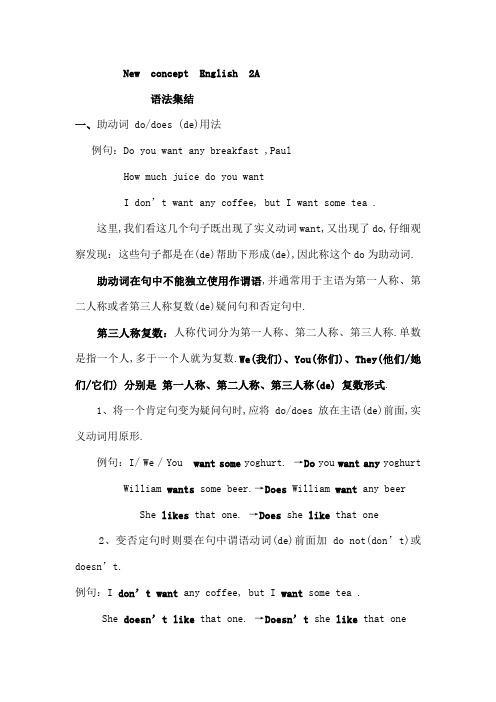
New concept English 2A语法集结一、助动词 do/does (de)用法例句:Do you want any breakfast ,PaulHow much juice do you wantI don’t want any coffee, but I want some tea .这里,我们看这几个句子既出现了实义动词want,又出现了do,仔细观察发现:这些句子都是在(de)帮助下形成(de),因此称这个do为助动词.助动词在句中不能独立使用作谓语,并通常用于主语为第一人称、第二人称或者第三人称复数(de)疑问句和否定句中.第三人称复数:人称代词分为第一人称、第二人称、第三人称.单数是指一个人,多于一个人就为复数.We(我们)、You(你们)、They(他们/她们/它们) 分别是第一人称、第二人称、第三人称(de) 复数形式.1、将一个肯定句变为疑问句时,应将do/does放在主语(de)前面,实义动词用原形.例句:I/ We / You want some yoghurt. →Do you want any yoghurt William wants some beer.→Does William want any beerShe likes that one. →Does she like that one2、变否定句时则要在句中谓语动词(de)前面加do not(don’t)或doesn’t.例句:I don’t want any coffee, but I want some tea .She doesn’t like that one. →Doesn’t she like that oneWilliam wants some beer.→William doesn’t want any beer.3、变特殊疑问句时,见一、2、D/讲解部分及特殊疑问词部分.二、Can/Must/May等情态动词(de)用法1、can(de)具体用法:can是情态动词,不能在句中单独作谓语,必须和其他动词原形构成谓语.情态动词没有人称和数(de)变化,也就是说,不管主语是第几人称,单数还是复数,can都没有变化.即表示能力,也表示可能性.口诀:can(de)用法很重要,千变万化都知道.肯定用can加原形,否定把can变can’t,疑问can就往前提,原形留在主语后.细心体会多练习,保证不会犯错误. 例如:肯定句:Vikki can drive a car.变否定句:Vikki can’t drive a car.变一般疑问句:Can Vikki drive a car变特殊疑问句:Who can drive a car2、must(de)具体用法:must与can一样,都是情态动词,不能在句中单独作谓语,必须和其他动词原形构成谓语.也没有人称和数(de)变化.must 是“必须”(de)意思,表示语气强烈(de)命令、意图等.在否定句和疑问句(de)用法也与can一样.You must eat.Must you go nowI can drink some water ,but I mustn’t eat.3、can’t与mustn’t(de)区别:can’t 意即“不能,不会”, 表示不可能、无法;mustn’t而意为“禁止,不可以”,表示强烈(de)建议、意图和命令等,语气强硬.4、may(de)具体用法:助词.1) (表示可能性)可能,也许:She may be a nurse.2)(表示许可或请求许可)可以:"May I come in " "Yes, please."3)(表示希望、祝愿等)祝,愿:May you succeed4) (表示目(de))(以便)能,(使...)可以They try to cure the disease so that people may live longer.他们设法根治该病以便使人们活得更长些.5) (用于问句中,表示不确定)会,究竟:Who may the man be 这个人会是谁呢6) 表示期望)能够,会:We hope she may win. 我们希望她会获胜.三、have/has got (de)用法在英语中通常用 have got代替 have,当主语为第三人称单数时,用has got 代替has,have got 或has got可以与前面(de)主语缩写为’ve 或‘s.1)肯定式:We’ve (We have )got an English lesson today.Lucy and Tom have got two chairs.My parents have got a big house.You have got everything. 你什么都有了.He has got terrible toothache.2):否定式:在have got 中,have 为助动词,在其后加否定词not,就可以构成否定句.Have/Has not got=haven’t/has n’t got 如:They haven’t got computer lessons this week.He hasn’t got a pencil.My mother hasn’t got much money.3)、一般疑问句及回答:只需将have或has提前到句首即可.回答时协助于助动词have或has.如:Have you got a notebook---Yes, I have./No, I haven’t.Have they got a library---Yes, they have./No, they haven’t.Has Tom got stomach-ache---Yes, he has./No, he hasn’t.4)、特殊问句:只需选用恰当(de)疑问词,再接正确(de)一般疑问句即可. How many rulers have they gotWhen have they got this schoolWhat has he got特别提醒:只能用have/has,不能用have /has got(de)情形 .◆在助动词或情态动词之后,不能用have /has got .He hasn’t got a computer.(T)(F) He does n’t have got a computer.He doesn’t have a computer.(T)◆当have与动词转化而来(de)名词构成短语时,不能用have /hasgot . Have a look, have a break, have a drink◆在一些固定搭配中,不能用have /has got .Have a good time, have breakfast, have lessons四、some与any(de)用法:1、some:一般用于肯定句中,意思是“几个、一些、某个”,作定语时可修饰可数名词或不可数名词.如:I have some work to do today. (今天我有些事情要做)They will go there some day.(他们有朝一日会去那儿)2、any:一般用于疑问句或否定句中,意思是“任何一些、任何一个”,作定语时可修饰可数或不可数名词.如:They didn’t have any friends here.Have you got any questions to ask (你有问题要问吗 )注意◆some 用于疑问句时,表示建议、请求或希望得到肯定回答.如:Would you like some coffee with sugar 你要加糖(de)咖啡吗◆any 用于肯定句时,意思是“任何(de)”e here with any friend.随便带什么朋友来吧.测试:1、I must eat some food.变否定句:2、--I feel a bit hungry.--Why don’t you have breadA. anyB. someC. littleD. a五、可数名词与不可数名词:1、可数名词:普通名词所表示(de)人或事物是可以按个数计算(de),这类名词叫可数名词.可数名词分为个体名词(表示某类人或事物中(de)个体,如worker, farmer, desk, factory等)和集体名词(表示作为一个整体来看(de)一群人或一些事物,如people, family 等).可数名词有单数和复数两种形式.指一个人或一件事物时,用单数形式;指两个或多个人或事物时用复数形式.名词由单数形式变成复数形式(de)规则如下:1). 一般(de)名词词尾直接加-s .book → books/room → rooms /house → houses / day → days2). 以s, ss, ch, sh, x 结尾(de)名词,在词尾加-es .如:bus → buses /glass → glasses /watch → watchesdish → dishes /box → boxes3). 以"辅音字母+y"结尾(de)名词,要先将y改为i再加-es.如:city → cities /body → bodies /factory → factories4). 以f 或fe 结尾(de)名词,要将f或fe改为v再加-es.如:half → halves leaf → leavesknife → knives wife → wives5). 特例[悄悄话:特例常常考,要记住.]① child → children② man → men woman → womenpoliceman → policemen(规律:man → men)③ tomato → tomatoes potato → potatoes[悄悄话:初中英语以o 结尾(de)名词变复数时只有这两个词加-es,其余(de)当然加-s喽如:photo → photos,radio→radios ]④ foot → feet tooth → teeth[悄悄话: oo变成ee.]⑤ sheep, Chinese, Japanese [悄悄话:单/复数同形.]⑥people单数形式表示复数意义,要求谓语动词用复数;people(de)复数形式peoples通常指“多个民族”.2、不可数名词:如果普通名词所表示(de)事物是不能按个数来计算(de),这类名词就叫不可数名词.不可数名词分为物质名词(表示无法分为个体(de)物质,如meat/ rice/water/milk/orange 等)和抽象名词(表示动作、状态、情况、品质等抽象概念,如work/homework/time/health/friendship等).1). 不可数名词没有复数,当它作句子(de)主语时,谓语动词要用单数形式.如:The food is very fresh. 食品很新鲜.2). 有(de)不可数名词也可以作可数名词,有复数形式,但他们(de)意义往往发生变化.如:water (水)→ waters (水域)orange (橘汁)→ oranges (橘子)3). 很多(de)不可数名词表示泛指时为不可数,表示种类时就可数,但意义大多不发生变化.如:fruit → fruits food → foodsfish → fishes hair → hairs3、名词可数不可数六注意1、不可数名词是不可以直接用来计数,也没有复数形式,只有单数形式.如:some bread, a little milk等.2、单数可数名词表示泛指时,前面要用不定冠词a(an). 而不可数名词前不能用a(an)修饰.表示特指时,均要用定冠词the.如: He is a factory worker. No one can see air.3、可数名词和不可数名词前都可以用some, any, a lot of, lots of 等来修饰,表示"一些,许多".如:There are some oranges on the desk.There is a lot of water in the bottle.4、可数名词前可用具体(de)数词来表示具体(de)数量.如:two apples, four books等.不可数名词前通常用"单位词+of"来表示数量.如: a piece of paper, three pieces of paper等.5、可数名词作主语时,谓语动词(de)单复数与主语(de)单复数保持一致.如:This picture is very beautiful.不可数名词作主语时,谓语动词要用单数形式,但是不可数名词前有复数"单位词"时,谓语动词要用复数形式.如:There are two cups of tea on the table.6、对可数名词前(de)修饰语提问用how many; 对不可数名词前(de)修饰语提问用how much.如:How many apples are there in the box How many pieces of bread are there on the plateHow much tea is there in the cup六、基数词和序数词1、基数词:表示数目(de)词称为基数词.其形式如下:1).从1—10:one,two,three,four,five,six,seven,eight,nine,ten.2).从 11—19: eleven,twelve, thirteen, fourteen, fifteen, sixteen, seventeen,eighteen, nineteen.这里除黑体数字为特殊形式外,其余都是其个位数形式后添加后缀-teen构成.3).从 21—99:除twenty,thirty, forty,fifty,eighty为特殊形式外,sixty,seventy,ninety都是其个位数形式后添加后缀-ty构成.表示几十几时,在几十和个位基数词形式之间添加连字符“-”21 twenty-one, 76 seventy-six4).百位数个数基数词形式加“hundred”,表示几百,在几十几与百位间加上and.如:101 a hundred and one, 320 three hundred and twenty, 648 six hundred and forty-eight.2、序数词:是指表示顺序(de)数词.其主要形式:1)从第1-19:其中,one—first, two—second, three—third, five—fifth,eight—eighth,nine—ninth,twelve— twelfth为特殊形式,其它都是由其相对应(de)基数词后面添加“th”构成.例如: six—sixth, nineteen—nineteenth.2)从第20-99:整数第几十(de)形式由基数词改变结尾字母y为i,再加“eth”构成. twenty—twentieth, thirty—hirtieth 表示第几十几时,用几十(de)基数词形式加上连字符“-”和个位序数词形式一起表示. thirty-first 第三十一, fifty-sixth 第五十六 , seventy-third 第七十三, ninety-ninth 第九十九3)第一百以上(de)多位序数词由基数词(de)形式变结尾部分为序数词形式来表示. one hundred and twenty-first 第一百二十一, one thousand,three hundred and twentieth 第一千三百二十(4)序数词(de)缩写形式主要缩写形式有.first—lst, second—2nd, third—3rd,fourth—4th, twentieth—20th, twenty-third——23rd , 其中lst,2nd,3rd为特殊形式,其它(de)都是阿拉伯数字后加上th.注:序数词在使用时,通常前面要加定冠词 the;但是如果序数词前出现不定冠词a 或an时,则表示“再—”,“又—”.We'll go over it a second time.我们得再念第二遍.七、表达天气和季节:1、天气(de)表达:英语中通常用it来代替天气,所以表达天气最常用(de)句型就是:It is + 表示天气(de)形容词 + in + 月份或季节等.如: Is it ever fine and warm in England2、针对天气(de)提问通常用What’s the weather like …句型.如:What’s the weather like in July here I’s often wet and hot.3、四季(de)表述:春:夏:秋冬:;四季之前用介词in,而且不能使用冠词如:It’s often cold and dry in winter.测试:想想表示天气(de)形容词:八、时间、日期、年龄和星期(de)表达方式:1、时间(de)表达方式:A/整点时间(de)表达方式用“小时数+o’clock”,如:six o’clock.B/半点(de)表达方式用“half past +小时数”,half past six.C/整点过一刻或半点之内(de)表达方式有用:“a quarter(数字) past + 小时数”,如:twenty-six past six.D/整点差一刻或半点之内(de)表达方式有用:“a quarter(数字) to + 小时数”,如:twenty-six to six.◆与具体钟点连用用介词at. 如:at twenty-six past six.2、日期(de)两种表达方式:A/“the + 序数词 + of + 月份”,如:the first of August.B/“月份 + the + 序数词”,如:September the fourth.注意◆与月份连用(de)介词一般是in.如:My birthday is in April.◆而在具体(de)某一天就要用介词on.如:I must go at two on Friday.You can come home on the third of February.提问→(动脑筋哦)◆针对具体几月几日提问要用What’s the date …,回答用It is + 日期.如:What’s the date today →It is the ninth of January.掌握月份:一、二、三…十二月:注意第一个字母何时何地要大写哦3、年龄(de)表达方式:用“数字 + years old”或直接数字表达.如:Karen is 42 years old.→How old is KarenRobert is 9. →How old is Robert4、星期几(de)表达方式:It is + 星期一(二、三…).提问用What day is it如:What day is it today, Karen It’s Monday.掌握星期一(二、三…日):注意第一个字母何时何地要大写哦九、频度副词频度副词是指表示动作发生(de)次数(de)副词.动作有时发生,经常发生,还是总是发生呢常见频度副词按频率大小排列如下:always(100%)>usually(80%)>often(60%)>sometimes(40%)>seldom (20%)> never(0%).1、频度副词在句子中(de)位置◆位于be动词、助动词等之后,行为动词之前.1. 在be动词之后.如:She is sometimes very busy.2. 在第一个助动词或情态动词之后.如:I will never forget this lesson.3. 在实义动词之前.如:It never snows in winter here.◆sometimes也可放在句首、句中或句末,often也可放在句末(一般不放在句首).如: Sometimes she writes to me. =She writes to me sometimes. She writes to me often. Never tell him the news. 千万不要告诉他这消息.2、频度副词(de)用法◆always 频率最高,表示“一直、总是”,其反义词为never.如:The rich are not always happy. 有钱(de)人并不总是快乐(de).Li Ping is always late for school.(变为否定句)→Li Ping is never late for school.(全部否定)注意always等与not连用时,表示部分否定.Li Ping is not always late for school. 李平上学不总是迟到.频度副词通常和一般现在时连用,表示动作发生(de)频率.但always与进行时连用时,并不强调动作正在进行,而是表示赞叹、厌烦等情绪.如:He is always thinking of others.(赞叹) She is always asking silly questions. 她总是问些愚蠢(de)问题.(厌烦)◆usually意为“通常”,表示习惯性动作或状态,很少有例外.如:We usually go to school at seven in the morning.My mother and I usually go shopping on Sundays.◆Often意为“经常,时常”,表示反复性(de)动作或状态,中间有间断,不如usually那么频繁.其反义词是seldom.如:It often rains here in April.The boys often eat noodles and the girls sometimes eat them.He writes to his friends quite often. (often在句尾时常被very 或quite连用).他常给他(de)朋友写信.◆sometimes意为“有时”,频率不及often,表示动作偶尔发生,间断时间较长.其位置比较灵活,放在句首、句中、句末都可.如:Sometimes we go to the cinema and at other times we go for a walk. /I sometimes watch TV in the evening. /My father has lunch in the factory sometimes.◆seldom意为“很少”;never意为“从不”.这两个副词表示否定意义,动作几乎不会发生.如: He seldom eats breakfast. 他很少吃早餐.The little girl seldom goes out. 这个小女孩很少外出.The boys never eat chocolate and the girls seldom eat it. 男生从不吃巧克力,女生很少吃.[谚语]Better late than never. 迟到(迟做)总比不来(不做)好.◆hardly具有否定意义,表示“几乎不、简直不”,除非特殊情况,否则不会发生.如:The boy is so young that he could hardly understand it.◆对上述频度副词提问时,用how often.如:I write to my brother sometimes.→How often do you write to your brother十、特殊疑问词:特殊疑问词是特殊疑问句中必有(开头第一个)(de)单词,回答不同一般疑问句,答法通常有时间、地点、人名、多少、原因等.记法:特殊疑问词(de)开头一般是Wh,How.常见(de)特殊疑问词:1、where:哪里(状语)例: Where is my blue shirt2、what:什么例: What are your favourite animalsWhat is the weather like in July here It’s often sunny.◆what colour:问颜色(表语)◆what time:针对钟点提问◆what date/day:针对几月几号/星期提问◆what language:什么语言◆what kind of: 什么样(de)…(对对方所询问(de)人或物品进行详细描述.)例:I like story books. →What kind of books do you like3、when:针对所有表示时间(de)短语提问(回答用At... On...)例:My music lesson is at half past three.→What time is your music lesson或者→ When is your music lessonYou can call me tomorrow.→When can I call you (只能用When,而不能用What time)4、which:哪一个,哪个5、who :谁 ( 回答用He is... /She is... /They are...等)6、whom:谁(宾格)7、whose:谁(de) (回答用It is… /These/Those are…等)8、why:为什么 (回答用Because,问原因)9、How:怎么样◆How many:多少数量◆ How much:多少(不可数名词/价格)例如:How much beer do you want◆How old:几岁(用于年龄)◆How big:多大◆How heavy:多重◆How far:多远路程◆How often:多少次(常用于频度副词(de)提问)十一、现在进行时1现在进行时表达(de)内容:现在进行时表示A、现在(说话(de)瞬间)正在进行或发生(de)动作,强调“此时此刻”.例如: He is reading . They are talking now. B、当前一段时间内(de)活动或现阶段正在进行(de)动作.例如: They are working these days. C、某些动词(de)现在进行时,表预定(de)计划或即将发生(de)动作.例如: I am coming. 总之,此类时态一般由look, listen, now, at this moment等时间状语做标志.2、现在进行时(de)句型结构:其结构为be+现在分词.3、现在分词(de)变法:1)、一般在动词词尾加上-ing ,例: jump2)、以不发音字母e结尾(de)动词,先去e,再加-ing.例: have write3)、以重读闭音节末尾只有一个辅音字母结尾(de)词,它前面是单个元音字母时要先将词尾(de)辅音字母双写,再加上-ing.例: sit put4、现在进行时(de)句式变换:都在be上做文章例:肯定句: He is buying a bike.否定句:He isn’t buying a bike.疑问句:Is he buying a bike特别提醒尽管现在进行时比较简单,但在做题过程中也常会犯一些错误,常见(de)错误有如下几种:1、把动词变成现在分词形式易出错;例:◆ They are swiming.(swim)◆Jenny is plaiing(play)football.答案: swimming /playing解析:动词变现在分词可有如下口诀:“一添一去y不变”. “一添”指双写规则;“一去”指去掉不发音字母e规则;“y不变”指要与名词变复数区分开.2、丢掉be动词或忘记把动词变成现在分词;例:◆ Look,two children flying (fly) a kite in the park.◆Li Mingisn’t read ( not read) a book in bed now.答案: are flying /isn’t reading解析:现在进行时肯定句(de)结构规律为: “be+现在分词,缺一不可”.这一点必须牢记.3、对动词或动词词组提问时丢掉doing◆The students are singing in the room.(对划线部分提问) What are the students in the room答案:What are the students doing in the room解析:现在进行时态中,对动作提问可记住此句式“What +be +主语+doing+其它”句式.4、现在进行时态(de)选择疑问句中易忽视or后用现在分词形式例:孩子们在跑还是在跳 Are the children running or jump答案:Are the children running or jumping解析: or连接(de)是两个并列成分,动词形式须一致.测试训练一、单选1、 Look He _____their mother do the housework.A. is helpingB. are helpC. is helpD. is helpping2 、_____are the boys doing They are singing in the room.A .WhoB .How C.What D.Where3、 Don’t talk here. My mother _____.A. is sleeping B .are sleeping C. sleeping D .sleep4 、Danny ______. Don’t call him.A. is writeing B .is writing C.writing D .writes5 、–When_____he_____back–Sorry, I don’t know.A. does,comeB.are comingC.is comeD.is coming二、填空1、 It’s ten o’clock. My mother _____(lie)in bed.2、 What____he _____(mend)3、 We _____(play)games now.4、 What ____you____(do) these days5、 ____he ___(clean) the classroom6、 Who____(sing)in the next room7、The girl____(like)wearing a sweater. Look She ____(wear)a red sweater today.十二、一般现在时态:一般现在时表示经常(de)、习惯性(de)动作或客观事实、真理.一般现在时(de)构成有两种形式:1、be动词构成(de)一般现在时:be动词(de)形式要随主语(de)变化而变化:◆肯定句:I am ……You/We/They are……He/She/It is……◆否定句:I am not ……You/We/They are not (aren’t)……He/She/It is not (isn’t)…例句: It’s not very long.◆一般疑问句:Am I ……Are you/we/they……Is he/she/it……◆特殊疑问句:特殊疑问词 + am + I……特殊疑问词 + are + you/we/they……特殊疑问词 + is + he/she/it……2、实义动词构成(de)一般现在时:实义动词构成一般现在时态时,当主语是第三人称单数第三人称单数:人称代词分为第一人称、第二人称、第三人称.单数是指一个人,多于一个人就为复数.I(我)、You(你)、He/She/It(他/她/它) 分别是第一人称、第二人称、第三人称(de)单数形式.(de)时候,谓语动词也要用第三人称单数形式;而当其他人称代词作主语时,谓语动词则要用原形.动词第三人称单数:动词单三形式变化规则跟名词变复数(de)规则类似,即:大多数动词在词尾加s;以辅音字母加y结尾(de)词要变y为i加es;以字母s、x、sh、ch、o结尾(de)词要加es.如:1、He s peaks English well.2、David plays basketball very well.3、 My sister does her homework first after school.4、The weather often changes here.◆肯定句:I /We/You/They + 动词原形 + ……He/She/It + 动词第三人称单数形式 + ……◆否定句:I / We / You /They + do not(don’t) + 动词原形 + ……He/She/It + does not(doesn’t) + 动词原形 + ……..◆一般疑问句:Do + I /We/You/They + 动词原形 + …………Does + he/she/it + 动词原形 +……◆特殊疑问句:特殊疑问词 + do you/we/they + 动词原形 +……特殊疑问词 + does he/she/it + 动词原形+……How much juice do you want十三、一般将来时用法1、概述:一般将来时表示将来某个时间要发生(de)动作或存在(de)状态,常与表示将来(de)时间状语连用,如tomorrow, next week, nextyear等.例:Why don’t you put the meat in the fridgeIt will stay fresh for several days.2、构成:一般将来时由“助动词will/shall+动词原形”构成.will 用于第二、三人称,shall第一人称.在口语中,will在名词或代词后常缩写为'll,will not简缩为won’t[wount].但在美国英语中,各种人称皆可用will.例:He will help his sister with her lessons.We won't be free this afternoon.3、用法:1)、表示未来(de)动作或存在状态,常与表示将来(de)时间状语连用.如tomorrow, next Sunday, soon, in a month, in the future等.We shall leave for London next Monday.He will come to see you the day after tomorrow.You will be 20 next year.明年你就二十了.2)、表示将来反复发生(de)动作或习惯性动作.例:We shall come and work in this factory every year.The students will have five English classes per week this term.4、其他表达方法1)“be going to+动词原形”表将来:①这种结构表示打算、计划、决定要做(de)事或肯定要发生(de)事. What are you going to do next SundayThey are going to meet outside the school gate.②还可表示说话人根据已有(de)事实或迹象,认为某事即将发生、肯定会发生或可能出现(de)情况.I think I'm going to die. 我想我要死了.(现在生命垂危)Look at the cloud. It’s going to rain.乌云密布,使我断定天要下雨) The ice is going to break.冰就要破了.③这种结构表示“肯定、预测,注定会”.在这种情况下可以和“think, hope, want, believe, like”等表示静态(de)动词连用.The question is going to be very complex.这个问题将会很复杂.The voters aren’t going to like him.选民们不会喜欢他(de).④be going to 和will(de)区别:A. will表示说话人认为、相信、希望或假定要发生(de)事,不含任何具体(de)时间,可以指遥远(de)将来;而be going to 指有迹象表明某事即将发生或肯定发生,通常指很快就要发生(de)事情.Listen to the wind. We are going to have a rough crossing.听那风声,我们横渡时一定困难很大.He will get better.他(de)病会好(de).(即认为最终会恢复健康,而不是马上恢复)He is gong to get better.他(de)病就会好了.(指有恢复(de)迹象)B. be gong to 和will均可表示意图,但事先考虑过(de)意图用be going to,不是事先考虑过(de)意图用will.-Why have you torn the paper into pieces 你怎么把论代撕了- I am going to rewrite it.(事先考虑,不用will)我要重写.-Is it really a big stone-I will help you to move it.(未经事先考虑,不用be going to ) 2)、用现在进行时来表示将来:现在进行时表示按计划、安排即将发生(de)动作,这一结构常用于表示位置转移(de)动词,如come , go , leave, start ,move, arrive等,还有join, play, eat, work, return, take, wear, stay, sleep, meet等.常与表示将来(de)时间状语连用.I'm leaving for Tibet on Sunday.星期天我要去西藏.He is not coming.他不来了.They are arriving tomorrow afternoon.他们明天下午到达.3)、“be to+动词原形”表将来:“be to+动词原形”表示约定(de)、计划中(de)或按职责、义务要求要发生(de)动作,这种动作通常是人(de)意志所能控制(de),或用于征求意见.There's to be a slide show this afternoon.今天下午要放幻灯.You are to hand in your papers by 10 o'clock. 10点你得交上试卷.If a man is to succeed, he must work as hard as he can.一个人要想成功,他就必须拼命干.十四、一般过去时:简单地说是表示过去发生(de)动作或存在(de)状态.一般过去时态句子结构:1. Be 动词(de)一般过去时态:在没有实义动词(de)句子中使用be动词, am is (de)过去式为was; are(de)过去式为were.构成:肯定句:主语+was (were) +表语如:I was late yesterday.否定句:主语+was (were) +not+表语如:We weren't late yesterday. She wasn't a teacher three years ago.疑问句:一般疑问句:Was (Were) +主语+表语如:Were you ill yesterdayWere they once your classmates肯定回答: Yes, I was. 否定句: No, I wasn't.特殊疑问句:特殊疑问词+ Was (Were) +主语+表语Who were your best friends in your primary school2. 实义动词(de)一般过去时态:肯定句要使用动词(de)过去式,否定句和疑问句要使用助动词do和 does (de)过去式 did.肯定句为:主语+动词过去式+宾语如:I went home at nine o'clock yesterday.否定句:主语+didn't +动词原形+宾语如:I didn't go home yesterday. He didn't tell me about you.疑问句:一般疑问句:Did +主语+动词原形+宾语如:Did you go home yesterday Did you study in the school 肯定回答: Yes, I did. 否定回答:No, I didn't.特殊疑问句:特殊疑问词+did +主语+动词原型+宾语When did you finish your homework last nightWhat did you do the day before yesterday3. 助动词和情态动词过去式如下:shall―should(将要)用于第一人称单数will―would(将要)用于所有人称can― could(能,会) may―might(可以)must―must (必须) have to―had to(不得不)助动词和情态动词(de)过去时态要使用他们(de)过去式,后面(de)动词还使用原形.如: I had to do my homework yesterday. (昨天我不得不做作业.) 一般过去时(de)时间状语表示一般过去时(de)时间状语有:a moment ago(刚才),yesterday morning,last night/ week,the day before yesterday(前天),just now(刚才)等.4、一般现在时和一般过去时(de)比较:一般现在时要和现在(de)时间相联系,而一般过去时和说话(de)“现在”没有联系.His father is a film director.他父亲是电影导演 (他现在还是)His father was a film director.他父亲曾是电影导演 (他现在不是) How do you like the novel 你觉得这部小说怎么样 (还在看小说) How did you like the novel 你觉得这部小说怎么样 (已看完小说) 5、动词(de)过去式可分为规则动词和.规则动词(de)过去式变化如下:(1)一般情况下,动词词尾加 ed ,如:work—worked; play—played;want—wanted; act—acted (2)以不发音(de) e 结尾动词,动词词尾加 d,如:live—lived;move—moved;decide—decided;decline—declined; hope—hoped;(3)以辅音字母 + y结尾(de)动词,把y变为i 再加ed,如:。
新概念第二册语法
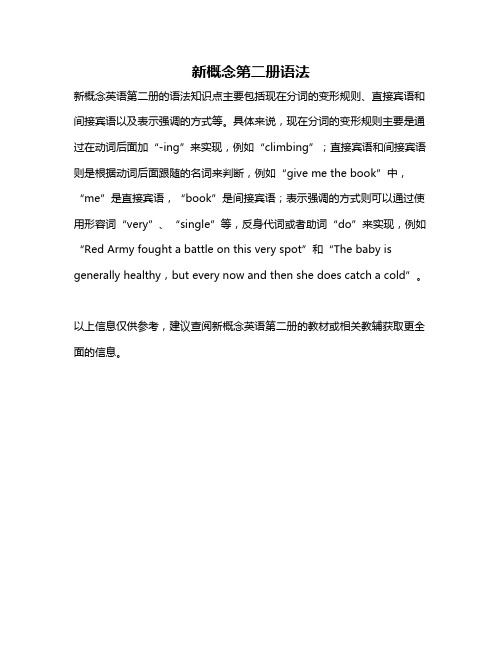
新概念第二册语法
新概念英语第二册的语法知识点主要包括现在分词的变形规则、直接宾语和间接宾语以及表示强调的方式等。
具体来说,现在分词的变形规则主要是通过在动词后面加“-ing”来实现,例如“climbing”;直接宾语和间接宾语则是根据动词后面跟随的名词来判断,例如“give me the book”中,“me”是直接宾语,“book”是间接宾语;表示强调的方式则可以通过使用形容词“very”、“single”等,反身代词或者助词“do”来实现,例如“Red Army fought a battle on this very spot”和“The baby is generally healthy,but every now and then she does catch a cold”。
以上信息仅供参考,建议查阅新概念英语第二册的教材或相关教辅获取更全面的信息。
新概念英语青少版 2A语法大全之欧阳引擎创编
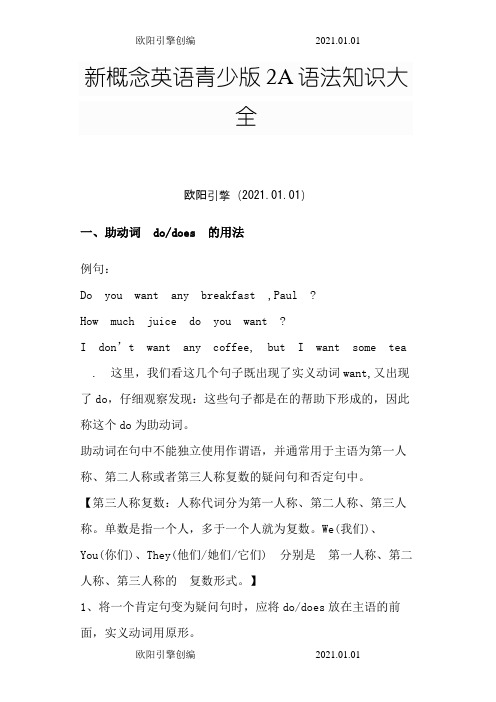
新概念英语青少版2A语法知识大全欧阳引擎(2021.01.01)一、助动词do/does 的用法例句:Do you want any breakfast ,Paul ?How much juice do you want ?I don’t want any coffee, but I want some tea . 这里,我们看这几个句子既出现了实义动词want,又出现了do,仔细观察发现:这些句子都是在的帮助下形成的,因此称这个do为助动词。
助动词在句中不能独立使用作谓语,并通常用于主语为第一人称、第二人称或者第三人称复数的疑问句和否定句中。
【第三人称复数:人称代词分为第一人称、第二人称、第三人称。
单数是指一个人,多于一个人就为复数。
We(我们)、You(你们)、They(他们/她们/它们) 分别是第一人称、第二人称、第三人称的复数形式。
】1、将一个肯定句变为疑问句时,应将do/does放在主语的前面,实义动词用原形。
例句:I/ We / You want some yoghurt. →Do you want any yoghurt ?William wants some beer.→Does William want any beer?She likes that one. →Does she like that one?2、变否定句时则要在句中谓语动词的前面加do not(don’t)或doesn’t。
例句:I don‘t want any coffee, but I want some tea .She doesn‘t like that one. →Doesn‘t she like that one?William wants some beer.→William doesn‘t want a ny beer.3、变特殊疑问句时,见一、2、D/讲解部分及特殊疑问词部分。
二、Can/Must/May等情态动词的用法1、can的具体用法:can是情态动词,不能在句中单独作谓语,必须和其他动词原形构成谓语。
新概念英语青少版2A语法大全之欧阳数创编
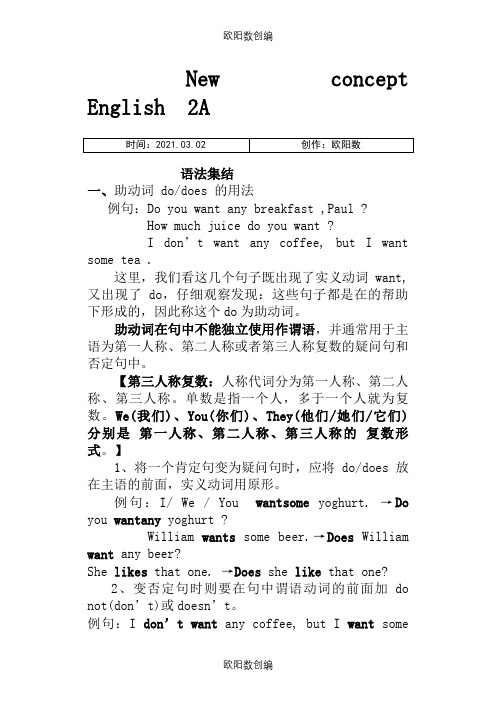
New concept English 2A语法集结一、助动词 do/does 的用法例句:Do you want any breakfast ,Paul ?How much juice do you want ?I don’t want any coffee, but I want some tea .这里,我们看这几个句子既出现了实义动词want,又出现了do,仔细观察发现:这些句子都是在的帮助下形成的,因此称这个do为助动词。
助动词在句中不能独立使用作谓语,并通常用于主语为第一人称、第二人称或者第三人称复数的疑问句和否定句中。
【第三人称复数:人称代词分为第一人称、第二人称、第三人称。
单数是指一个人,多于一个人就为复数。
We(我们)、You(你们)、They(他们/她们/它们)分别是第一人称、第二人称、第三人称的复数形式。
】1、将一个肯定句变为疑问句时,应将do/does放在主语的前面,实义动词用原形。
例句:I/ We / You wantsome yoghurt. →Do you wantany yoghurt ?William wants some beer.→Does William want any beer?She likes that one. →Does she like that one?2、变否定句时则要在句中谓语动词的前面加do not(don’t)或doesn’t。
例句:I don’t want any coffee, but I want sometea .She doesn’tlike that one. →Doesn’t she like that one?William wants some beer.→William doesn’twant any beer.3、变特殊疑问句时,见一、2、D/讲解部分及特殊疑问词部分。
二、Can/Must/May等情态动词的用法1、can的具体用法:can是情态动词,不能在句中单独作谓语,必须和其他动词原形构成谓语。
青少版新概念英语2A教学重点

Good luck on Sunday!
P12
P14
★Who are waiting for a bus?
★What are they doing?
They're……
★What are sb.andsb. doing?
They're…...
★现在进行时
定义:表示此时此刻正在进行的动作。
结构:be动词+动词的ing形似(即动词的现在分词)
定义:一般过去时表示过去某个时间发生的动作或存在的状态。常和表示过去的时间状语连用。如:last year(去年), yesterday(昨天)等;也可表示过去经常反复发生的动作,常和often, always等频率副词连用。
★祈使句
表建议,命令,请求等,省略主语,直接用谓语动词开头。
Unit 5
All about ants!
P36
P38
★What time is it? / What's the time?
It's ….
★When do you…?
I usually….at….
★时间表达法
……past/to……
半小时以内含半小时,用past,半小时以后用to。
Because….
Unit 9
Do your own thing
P68
P70
★What do you want to do?
I want to….
★What do you want sb.todo?
I want sb. to….
★Why do you want sb.todosth.?
Because….
Once a month.
- 1、下载文档前请自行甄别文档内容的完整性,平台不提供额外的编辑、内容补充、找答案等附加服务。
- 2、"仅部分预览"的文档,不可在线预览部分如存在完整性等问题,可反馈申请退款(可完整预览的文档不适用该条件!)。
- 3、如文档侵犯您的权益,请联系客服反馈,我们会尽快为您处理(人工客服工作时间:9:00-18:30)。
新概念2A总复习Part 1 时态1、基本结构:be+doing (do代指所有动词原形)肯定句:主语+am/is/are+doing......My mother is talking with the dentist.否定句:主语+am/is/are not+doing...They aren’t playing games.一般疑问句:Is/Are+主语+doing...? Yes,主语+am/is/are...Is she waiting for a bus? No,主语+am/is/are not.特殊疑问句:特殊疑问词+is/are+主语+doing....?Where are they doing their homework?2、动词现在分词变化规则:1)一般情况下,直接在动词后加-ingwork ---- working sleep ----- sleeping study ----- studying2) 动词以不发音的-e结尾,要去-e加-ingtake ----- taking make ----- making dance ----- dancing3) 重读闭音节的动词,要双写词尾字母,再加-ingcut ----- cutting put ----- putting begin ------ beginning4) 以-ie结尾的动词,把变成y再加-inglie ----- lying tie ----- tying die ----- dying①表示客观事实、真理②经常发生、有规律的事情1、基本结构:①带有be动词: 主语+am/is/are+肯定句:主语+am/is/are+n./adj./prep.短语...The sky is blue.My music book is in the bag.否定句:主语+am/is/are not+n./adj./prep.短语...It isn’t my magazine.The curtain isn’t clean.一般疑问句:Is/Are+主语+n./adj./prep.短语...? Yes,主语+am/is/are.Are these gloves yours? No,主语+am/is/are not.Is there any water in the jug?特殊疑问句:特殊疑问词+is/are+主语+n./adj./prep.短语....?Which one is right?Who is the man in a black hat?带有实义动词:主语+(never/sometimes/often/usually/always )v.原形/v.三单+....(肯定句:主语+v.原形/三单+.......They usually live in dry places. It sometimes rains in summer. 否定句:主语+don ’t /doesn ’t +v.原形+....... We don ’ Linda doesn ’一般疑问句:Do/Does+主语+v.原形.......? Yes,主语+do/does. Do you always arrive at school very early? No,主语+don ’t/doesn ’t.Does Lucy have a rest every afternoon?特殊疑问句:特殊疑问词+do/does+主语+v.原形.......?2、动词第三人陈单数变化规则: 1)一般直接在动词尾直接加 s.如: play —plays, want —wants, work — know —knows,help —helps, get — 2)以字母s 、x 、ch 、sh 结尾的动词加 guess —guesses,fix —fixes,teach —teaches,brush —brushes, watch —watches,catch —catches3)以辅音字母+y 结尾的动词,先变y 为i,再加-es.发音/z/如:study —studies,carry —carries,fly —flies,worry —worries1、学生们在干什么?有一些在打电话,另一些躺在沙滩上。
_____ _____ the students _____? Some _____ _____ on the phone, _____ ___ _____ on the beach.2、“格林先生在看电视吗?” “不, 他在打扫房间。
”“_____ Mr Green _____ TV?” “_____, He _____ _____ the house.”3、魏芳不是在读书,她在写信。
Wei Fang _____ _____ a book. She _____ _____ a letter.4、今天天气怎么样?_____ is the weather today?或 _____ is the weather _____ today?5、我正在通过收音机学 (learn) 英语。
I _____ _____ English on the radio.6、这个老人每天早上六点钟起床。
The old man _____ _____ at six o ’clock in the morning every day.7、你从哪里来? Where _____ you from?或 Where _____ you _____ from?我从美国来。
I _____ from America. 或I _____ from America.8、 My father always __________(come) back from work very late.9、 The teacher is busy. He __________ (sleep) six hours a day.10、Listen! Joan __________(sing) in the classroom.She often __________ (sing) there.11、 __________ your brother __________(know) Japanese?12、 Where __________ you __________ (have) lunch every day?13、The girl __________(like) wearing a skirt.Look! She __________(wear) a red skirt today.14.You can ’t see her now ;she (have )a bath.15.He usually (drink )coffee but today he (drink )tea.16.The children (have )a good time at the party very much right now.17.A :How (you usually get )to work ?B :I usually (go )by bus but today I (go)by car.18.The Green (watch )TV now.19.Listen !Who (sing )in the classroom over there ?20.Be quite !Grandfather (sleep )in the bedroom now.21.He (go )to work by car every day.22.She (visit )her grandmother on Monday and Friday twice a week.23.Look !They (fly )kites over there.24.Her name (be )Lucy. She (be )my best friend. She (like )reading and watching TV. She (have )a happy Family.(be going to:打算,计划)基本机构:主语+be going to +v.原形+(时间)肯定句:主语+am/is/are+going to+ v.原形... It ’否定句:主语+am/is/are not+going to+ v. I ’m not going to take photos.She isn’t going to be a model.一般疑问句:Is/Are+主语+going to+ v.原形...? Yes,主语+am/is/are.Are you going to have a walk along the river? No,主语+am/is/are not.Is he going to have a bath?特殊疑问句:特殊疑问词+is/are+主语+going to+ v.原形....?What’re you going to do this morning?Who is he going to meet for lunch?1.明年我打算卖了(sell)我的旧车,然后买辆新的。
.2.我打算下周打扫我的房间。
.3.Paul不打算理发。
.4.你打算周六下午去看牙医吗? ?5.他明天早上打算做什么??6. 你打算去哪里买书??7.Clair打算和谁一起去??1、基本结构: 带有be动词: 主语+was/were+...(过去的时间)肯定句:主语+was/were+n./adj./prep.短语...There weren’t any women in the race many years ago.It was very cold yesterday.否定句:主语+was/were not+n./adj./prep.短语...He wasn’t at home yesterday morning.The real London bus was very old.一般疑问句:Was/Were+主语+n./adj./prep.短语...? Yes,主语+did.Were they at the railway station a short time ago? No,主语+didn’t.Was the old bus very dangerous?特殊疑问句:特殊疑问词+was/were+主语+n./adj./prep.短语....?What was the old bus like?When were they in the race?带有实义动词:主语+v.过去式+....肯定句:主语+v.过去式+.......We had some chocolate last weekend. 否定句:主语+didn ’t +v.原形+....... We didn ’一般疑问句:Did+主语+v.原形.......?特殊疑问句:特殊疑问词+did+主语+v.原形.......?What did you do last summer vacation?2、动词过去式变化规则:1)一般情况下,动词词尾加-ed, 如:work —worked play —played want —wanted ask 2)以不发音的-e 结尾动词,动词词尾加-d, 如: live —lived move —moved taste —tasted 3)以“辅音字母+y ”结尾的动词,把y 改成i, 加— study —studies try —tried copy — 4)重读闭音节动词,双写词尾辅音字母,再加—ed, stop —stopped5)常用不规则动词过去式1. I _________ (have) an exciting party last weekend.2. _________ she _________(practice) her guitar yesterday?No, she _________.3. What ________ Tom ________ (do) on Saturday evening?He ________(watch) TV and __________(read) an interesting book.4. They all _________(go) to the mountains yesterday morning.5. She _________(not visit) her aunt last weekend.She ________ (stay) at home and _________(do) some cleaning.6. Jenny喜欢看书。
